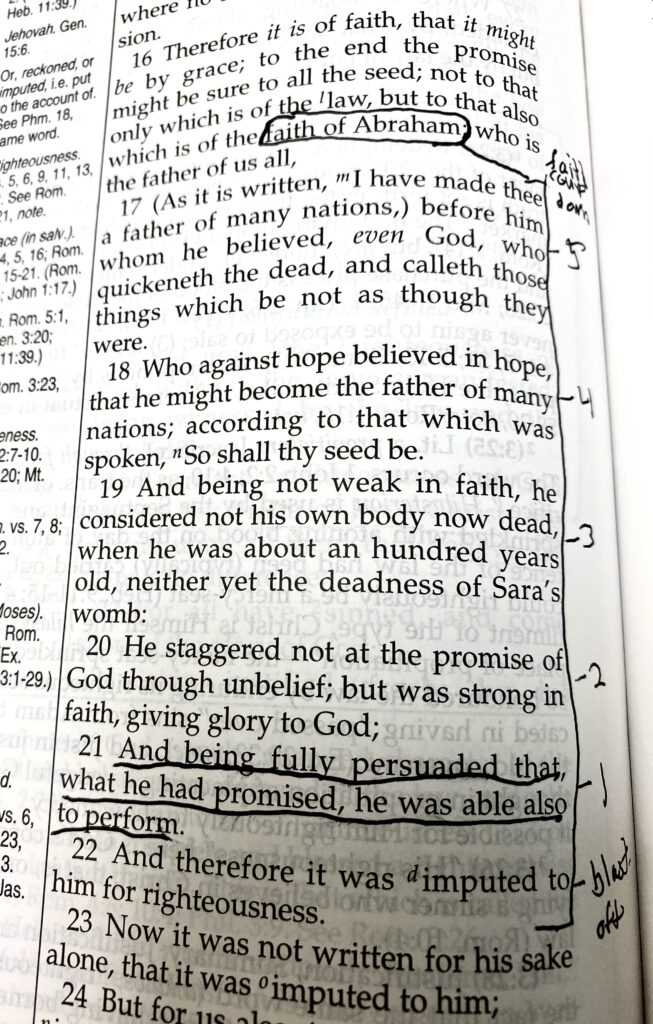Did Peter not have enough faith to stay afloat, or are we missing the real reason he sank? A word study sheds a bit of illumination on the REAL reason for his “lack of faith.”
Most, if not all Christians, are familiar with Peter’s walk on the water and how he sank like a stone when he looked at the turmoil around him. If the story is a little foggy, here are the passages:
“And in the fourth watch of the night Jesus went unto them, walking on the sea. And when the disciples saw him walking on the sea, they were troubled, saying, It is a spirit; and they cried out for fear. But straightway Jesus spake unto them, saying, Be of good cheer; it is I; be not afraid. And Peter answered him and said, Lord, if it be thou, bid me come unto thee on the water. And he said, Come. And when Peter was come down out of the ship, he walked on the water, to go to Jesus. But when he saw the wind boisterous, he was afraid; and beginning to sink, he cried, saying, Lord, save me. And immediately Jesus stretched forth his hand, and caught him, and said unto him, O thou of little faith, wherefore didst thou doubt?”
Matthew 14:25-31 KJV
We’ve heard it from the pulpits and from Bible studies, that Peter lost his faith mid-stream as it were.
But what does that mean exactly? Did Peter not have any faith at all, or was it something else – a finely split hair that we need to see.
It’s the “o thou of little faith” that deserves a closer look.
Word study of “oligopistos”
“Oligopistos” (Strongs G3640) is used in 5 spots in the Bible, including the verse above:
- “Wherefore, if God so clothe the grass of the field, which to day is, and to morrow is cast into the oven, shall he not much more clothe you, O ye of little faith? G3640” ~ Matthew 6:30
- “And he saith unto them, Why are ye fearful, O ye of little faith? G3640 Then he arose, and rebuked the winds and the sea; and there was a great calm.” ~ Matthew 8:26
- “Which when Jesus perceived, he said unto them, O ye of little faith, G3640 why reason ye among yourselves, because ye have brought no bread?” ~ Matthew 16:8
- “If then God so clothe the grass, which is to day in the field, and to morrow is cast into the oven; how much more will he clothe you, O ye of little faith? G3640” ~ Luke 12:28
In the above passages, the basic definition of “oligopistos” applies — of little faith, trusting too little.
What’s interesting is when you break down the word to it’s roots – G3641 – oligos and G4102 – pistis. This is where we start to split hairs, which is necessary in word study. Each root word – oligos and pistis are defined as follows:
- G3641 – oligos: of time: short, and of degree or intensity: light, slight
- G4102 – pistis: belief with the predominate idea of trust (or confidence) whether in God or in Christ, springing from faith in the same
The combination of these root words goes into the overall meaning of oligopistos.
Ok professor, what does this say about Peter?
Well, quite a bit.
When we re-read Matthew 14:25-31, we see something interesting. Peter asked Jesus to walk on the water (verse 28), to which Peter stepped out and started walking to Jesus (verse 29)…
STOP — ok, does the “o thou of little faith” apply to the “pistis” part of oligopistos – a LACK of belief with the predominate idea of trust (or confidence) whether in God or in Christ, springing from faith in the same?
NOPE! Peter was walking for a time…and that’s the key! Peter’s “o thou of little faith” did not have anything to do with trust…I mean he (Peter) ASKED Jesus “if it be thou bid…”, so Peter had confidence in the authority of the source – that being Jesus.
It was the “oligos” part of the word – of degree or intensity.
Peter sank because he didn’t have the intensity/duration of faith when he saw the waves around him. It’s like a sprinter trying to run a marathon. Peter’s first part of his run was STRONG – the “pistis”, but his endurance wasn’t up to snuff – the oligos”.
Ok, but what if I’m lacking in the “oligos” part?
I called this “the faith countdown.“ It speaks of father Abraham and how he was promised by God to be a father of many nations, but Abraham had to struggle with a very practical barrier – the fact that he and his wife were old, specifically that…Abraham couldn’t “perform.”
I

In reading the countdown, you see how Abraham had to work out in his mind that in order for the promise of God to be fulfilled, he had to be “persuaded“ that it was true. In other words, he had to convince himself that the impossible had to be possible, and in doing so, his actions helped him to “rise to the occasion“ and set faith into action, which justified him.
Faith is key, not only in the day-to-day things, but in understanding that God wants us to be His Kids through Jesus Christ – that if we were to say “yes” to His Grace through the atoning work on the Cross, Jesus not only become our Savior & Lord but also becomes our elder brother (Hebrews 2:11-15). Through Jesus, we have the promises of God – all of them – and we are citizens of Heaven, as well as reigning and ruling with Christ in the New Heaven & Earth (2 Corinthians 1:20, Philippians 3:20-21, 2 Timothy 2:12).
The takeaway
There are two aspects of faith – the trusting of the source, and the duration of that trust. Peter’s faith lacked not in the former, but the latter. Many of us fall within that pit, that when we see things stay bad for a duration of time, we sink, just like Peter. Take care not to fall not only into the waves of “pistis”, but also into the waves of “oligos.”
We must also remember that faith is not an intellectual construct – something we create by gaining information. Faith comes from God as one of the fruit of the Holy Spirit (Galatians 5:22-23). We can’t gain or lose faith, we have simply been given a portion (Romans 12:3), so don’t ask for more as the disciples did (Luke 17:5), because we have more than enough (Matthew 17:20, 20:21, Mark 9:23, 11:23, Luke 17:6). Simply put, you have to “walk-in” the promises and gifts God has given to you.





